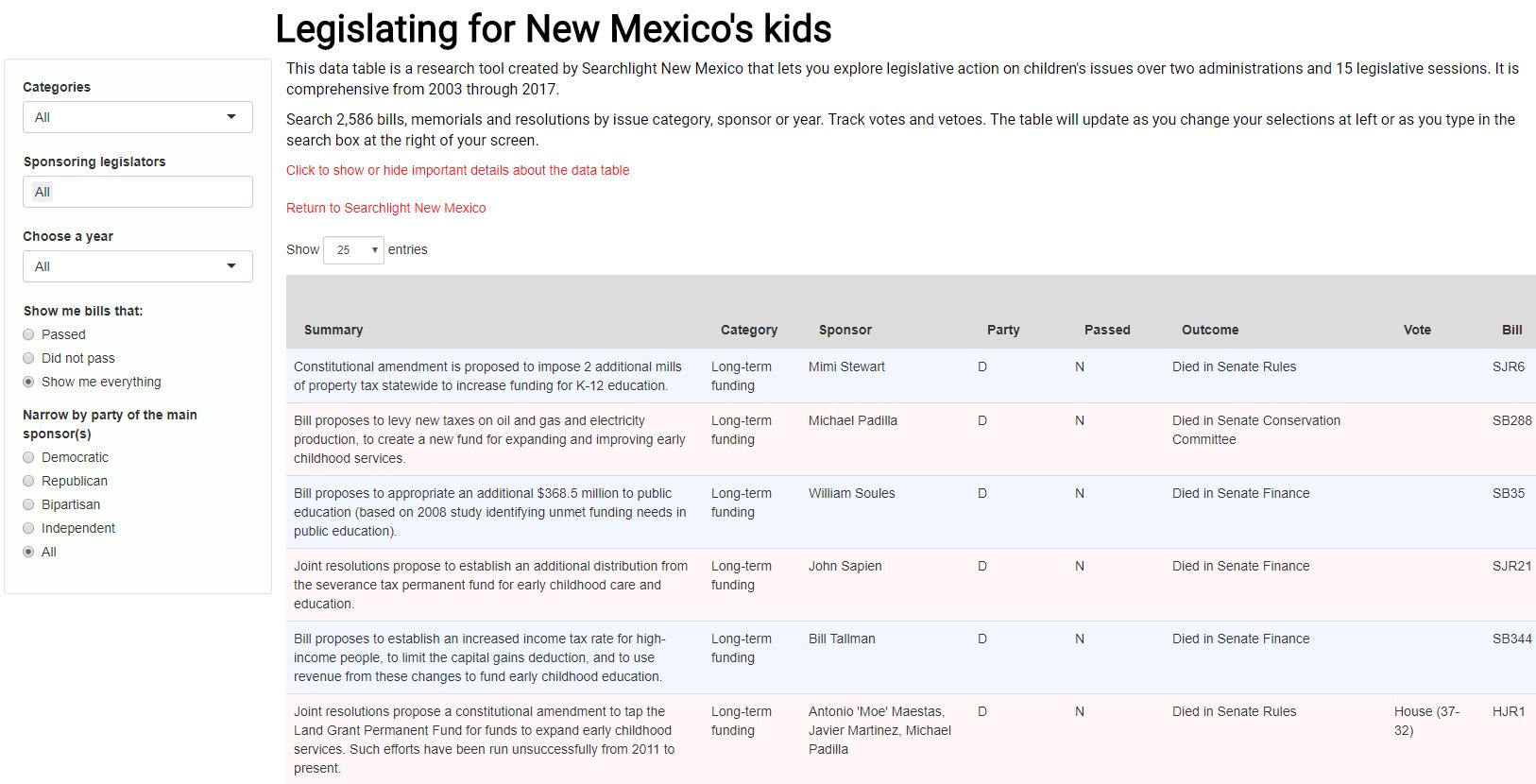Editor’s note: This article was first published on Searchlight New Mexico and has been republished with their permission. Minor style changes were made with permission.
The big idea — a plan to close the achievement gap between low- and upper-income students — jumped off the pages of a magazine.
It was 2003, and then-Rep. Mimi Stewart, an Albuquerque Democrat and former schoolteacher, read an article by the late leader of the American Federation of Teachers union, Sandra Feldman. She proposed adding five weeks to the school year for low-income kindergarten students and called it “Kindergarten-Plus.”
Stewart ran a bill to create the program in New Mexico.
Her version of Feldman’s idea had many things going for it — not least that Stewart herself had already spent eight years in the House building political capital. Democrats had full control of the Roundhouse and a governor from their party. Plus, it didn’t hurt that the idea was supported by a powerful teacher’s union.
The time was good, too, for a budget request: New Mexico was rich with cash from an oil boom.
“It was an immediate success because these schools — teachers, principals — saw a huge gain among those who were in school 40 days longer,” Stewart said, adding that parents loved it, too. “The program made (the children) look so different.”
The program started as a small test in four school districts and, over 10 years, was expanded to third grade and renamed K3-Plus. A 2017 study by the Legislative Finance Committee showed K3-Plus and pre-K combined effectively brought low-income kids up to par with their peers at kindergarten entry — the Holy Grail for child advocates.
But for all its promise, the Legislature’s efforts to expand the program have been intermittent. Today, more than 50,000 students who are eligible for K3-Plus don’t have access to it.
The program is indicative of a Legislature and executive branch which over the years, have failed to act on hundreds of bills that might have helped New Mexico climb out of the depths of national child well-being rankings. An analysis by Searchlight New Mexico of 15 years of proposed legislation involving children shows a consistent pattern of proposals failing at their earliest stages, often without a hearing.
Bills that had the best chance were often incremental and unlikely to spur sweeping change. And even bills like Stewart’s that passed as pilot programs — and proved their worth — have been slow to gain traction.
“I wouldn’t say that New Mexico state government has failed children,” said Sharon Kayne, a spokeswoman for New Mexico Voices for Children, an advocacy group. “Rather, it has failed to take a comprehensive, coordinated approach to improving child well-being.”
“It dabbles a bit here and tries something new there and hopes that small fixes will cure a very big and complex problem,” she said.
Searchlight’s data analysis, along with interviews with numerous child advocates, lobbyists and lawmakers, shows efforts to improve child well-being increasingly mired in partisanship.
The bitterness that characterizes national politics has also come home to roost.
“I have slowly seen it get more polarized, more divisive, more partisan every year,” said J.D. Bullington, a 22-year lobbyist for education, Native American issues and health care.
Even when everyone agrees that a problem exists — for example, the fact that 77 percent of the state’s schoolchildren aren’t reading-proficient by fourth grade — the proposed solution is often maligned.
“The politics determine the outcome of a solution,” Bullington said.
Consider legislative efforts to hold back third-graders who can’t read. Ending so-called “social promotion” was a cornerstone of Republican Gov. Susana Martinez’s public education reform agenda, which echoed many of the ideas then-Gov. Jeb Bush pushed successfully in Florida in 1999.
Martinez promoted the idea again in her recent “State of the State” address.
Despite early bipartisan support, the third-grade reading initiatives quickly turned into political poison. The issue has by now become so divisive that even the most benign legislation — a bill proposing to gather data or help kids learn to read — is targeted for failure.

“Each piece of legislation is not considered in a vacuum,” said Jennifer Ramo, executive director of New Mexico Appleseed, a nonprofit focused on childhood poverty. “We don’t think one side has a corner on the market in caring about children.”
This year, voters will elect a governor, lieutenant governor, land commissioner and 70 members of the House of Representatives, potentially reshaping politics and policy-making around children’s issues.
That also means 2018 is a season for the state’s top lobbying groups to reset their agendas and get out the vote among their members.
Thanks to a memorial approved with bipartisan support last year, Appleseed is working with the LFC and University of New Mexico to develop a database capable of informing lawmakers which programs for families work and which don’t. It will help them determine how to get the most out of taxpayer dollars.
“We are true believers that these interventions work, and they have known payoffs,” said David Abbey, LFC executive director. “I think we’ve moved beyond ‘These are good ideas, we ought to pilot them,’ to, ‘These are good ideas, we ought to serve more people.’ But we’ve got to do it right.”
Lauren Villagran is a reporter for Searchlight New Mexico based in Las Cruces. She roams southern New Mexico and the borderlands she can be reached via Twitter @LaurenVillagran.
